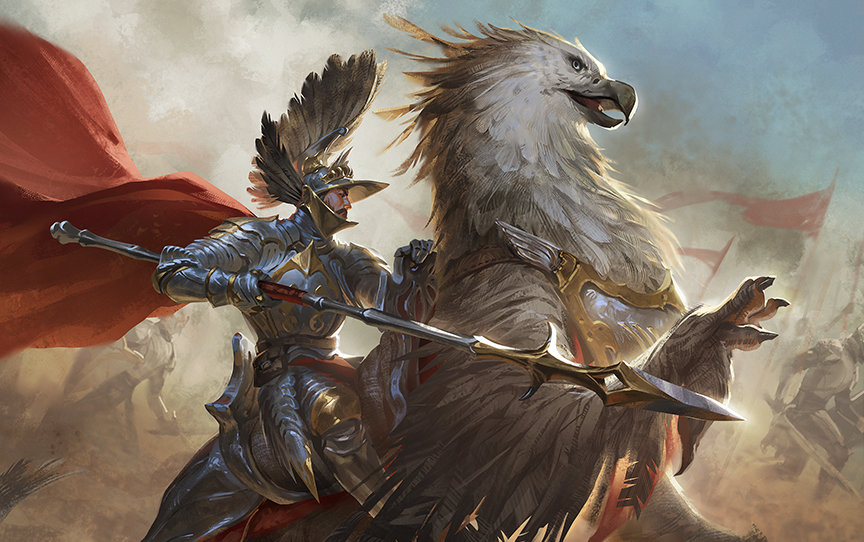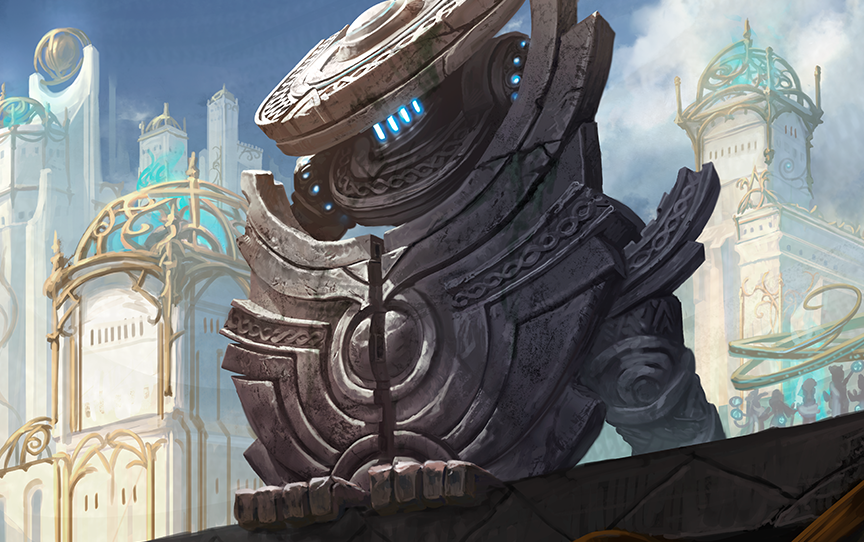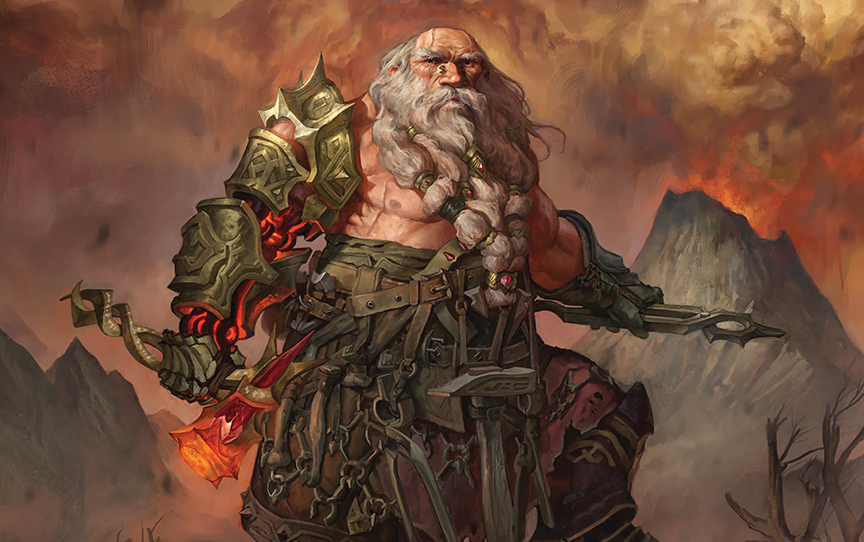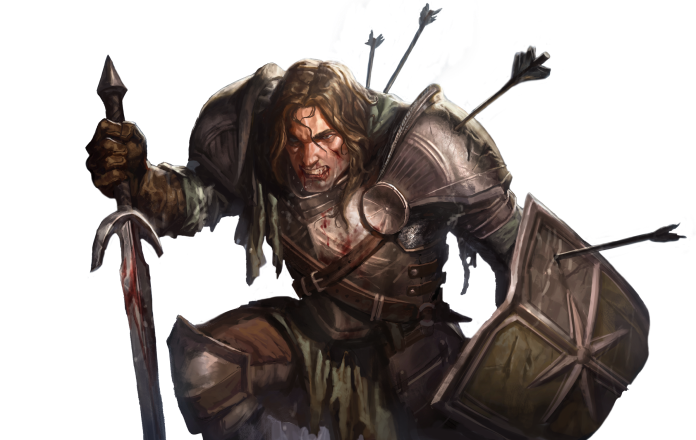
Highly militaristic, defensive, and straightforward, the Order of the Shattered Throne trains their soldier to be a bastion as immovable and enduring as the great Aurean Gates of Astaris.
by Nicky Lobo, Game Designer
Since the dawn of time, the four factions were supposed to be organized in two axes in opposition to one another, not only in their philosophy but in playstyle as well. Two of those core principles were “Active vs. Reactive”, some factions would be better at solving problems proactively while others had better options to respond at the last minute, and “Doer vs. Planner”, to determine if they would be better at dealing with their enemies more straightforwardly, through your units on the table, or using spells and other “dirty tricks” to get the upper hand. That doesn’t mean that the factions were shackled to those principles, but it means that, more often than not, those are the guidelines to be followed.
In the Order’s case, they were supposed to be fashioned as the more classical “good guys” (or as much of a good guy as you could be in Agnar), with the ideas of Life, Fairness, Equality, Law, Organization, Divinity, Honor, Discipline, Hierarchy, Protection, and Light being their core concepts. Those ideas lend themselves really well to a classic tank archetype, being built to sustain damage and advance unscathed, and in a fantasy setting, what more could you ask for our knights in shining armor?

With all those paladins eager to smite any fiend on the battlefield, the faction was primed to work around their soldiers on the board, with the militaristic side of their aesthetic fitting nicely for the more classical elements of wargaming and combat in general, caring about positioning, formation, and overall good fundamentals. Their heavy emphasis on defense means they will probably care more about standing their ground, with protective spells, denying their opponent’s key strategic advantages, and having a say on which warrior falls and which advances.
Their strengths should lie in working together toward a common goal, symbolized by their emphasis on effects that care about Units being adjacent or close to each other, bolstering their resiliency, receiving strategic benefits from that proximity, rewarding players that engage their opponents in glorious melee combat, and even sometimes being able to call their allies to the fray with them.

All that armor is really cumbersome though, which is not the best when you want to just sprint from A to B, nor to aim precisely at a fast-moving target. They also are the single faction without access to some form of direct damage, which can be troublesome against more slippery and cowardly targets. Finally, they are very loyal, sometimes to a fault, meaning we rarely want to give them abilities that would be too opportunistic and create those “gotcha” moments. A true follower of the will of Valcaris would defeat their opponent fair and square.
This leaves us with a good standard of what to expect from the Order most of the time. They should have Units that have a better-than-average stat line both offensive and defensive-wise, but lacking in mobility and/or range. Although they disapprove of the use of dirty tricks on the battlefield, it doesn’t mean that they’d turn a blind eye to such blatant “cheating”, being represented by cards that become particularly potent to counteract ways your opponent might try to get an upper hand, punishing those who try to keep a plan for every contingency ready or evening the fight when an endless horde tries to swarm your valiant knights.
Although the Order is supposed to be able to react to their opponents, their responses tend to be more straightforward or telegraphed, but not less potent because of it. In a game where taking damage from each attack is almost always a certainty, Sigrith simply laughs and offers you a powerful divine retribution for your trouble. Auric requires you to suit up and arm your units properly but rewards your discipline by providing efficient and almost endless access to more recruits, extra damage, protection, you call it.

Lastly, although the bastion of honor, discipline, and civilization, sometimes you might need to call reinforcements with means that are less… Orthodox. Allying yourself with the Conclave can help you deal with targets at longer ranges or that rely on more arcane means that might be used to bypass your strong defenses. Their tendency to work more around spells also complements your frontlines nicely, keeping some options open and dynamic throughout the game, and combining their ability to respond to threats means probably the strongest defensive combination of factions. The savages from the Primal Blood, when disciplined correctly, can offer valuable aid. Excelling at mobility while also carrying strong synergies with positioning and units acting together, means you should be right at home when advancing your troops forward and having a strong board presence, hammer and anvil style. Allying yourself with the Legion would be scorned by most that follow the seven lights, but sometimes you must keep your enemies close. Their endless numbers can counteract your more elite army, and although a morbid mimicry of your more holy arts, they offer great access to abilities to provide resources and keep your forces standing, while complementing your heroes with powers to shut down even the hardest of foes.

That is how the followers of Valcaris should bolster their forces and venture on the holy mission towards the Malediction. And how about you, soldier? How do you plan on bringing glory to Dynas and restoring this desolate world to its Everlasting prime?

While the Order sees magic as a taming of chaos, the Conclave sees it as the clay through which the ancient, powerful magics of the Agnar before the Fall can be given form once again.

Some Seekers are much closer to the classic definition of a hero than others, but all of them have the power to change the world in some significant way.

Highly militaristic, defensive, and straightforward, the Order of the Shattered Throne trains their soldier to be a bastion as immovable and enduring as the great Aurean Gates of Astaris.
